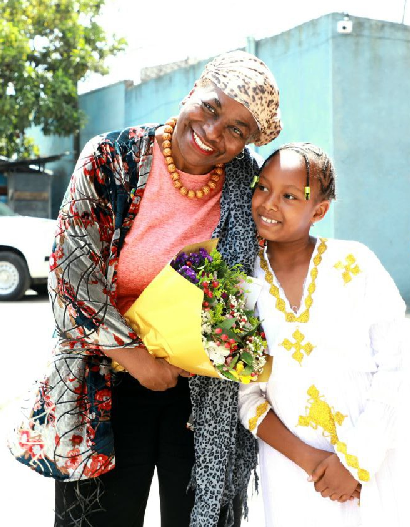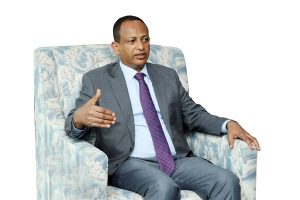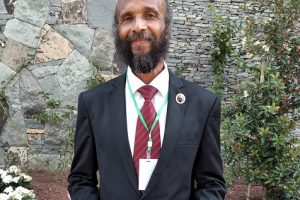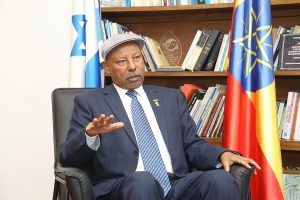
Today’s guest is Dr. Natalia Kanem, the United Nations Under-Secretary General and Executive Director of the United Nations Population Fund (UNFPA). She had spent a few minutes with The Ethiopian Herald while she was in Addis Ababa to participate in the African Union Summit that was recently held.
During the interview, Natalia raised a range of issues, including the ongoing UNFPA advocacy efforts to implement the people-centered development for which the organization and its partner are mobilized and working together. One of those is the campaign for the acceleration of the reduction of maternal mortality in Africa led by the African Union and some other initiatives that are aiming to advance reproductive health, gender equality, and women’s empowerment in individual countries. Have a nice read!
Would you briefly tell us about UNFPA’s intervention areas in Ethiopia and Africa, please?
It is a privilege for me to be back on the soil of Ethiopia, where just last year UNFPA, which is the United Nations Sexual and Reproductive Health Agency, marked its 50 years of working in partnership with the people and government of this beautiful country in an ever-forward march towards a world of rights, dignity, and choices for all.
UNFPA is proud of the work that we do with the 10-year-old girl’s insight. The focus of our work is putting women and girls at the center of development. And all across this country, our organization is partnering with the government, with civil society partners, and with the medical system to ensure comprehensive sexual and reproductive health services, including the availability of necessary health commodities, medicines, equipment, and protective commodities that are required.
UNFPA today procures about one-third of Ethiopia’s public contraceptive requirements. We support government efforts to address the gap in human resources for maternal health. And we are doing this through capacity-building programs like Integrated Emergency Surgery, Obstetrics, and Accelerated Midwifery.
Midwives save lives, and we cooperate with the international midwifery system to try to double the number of midwives all around the world in 2030. Similarly, UNFPA is the leader in the United Nations system for population and development. We have supported population and housing censuses here in this country in 1984, 1994, and 2007. And we continue to work towards the fourth population and housing census and support the fifth demographic and health survey round.
East Africa is a volatile region. As a result, women and children are highly engaged in various traumatic situations. How UNFPA assist people in difficult scenarios?
Peace is the noble purpose of the United Nations, and it is also the wish of every woman in this world. Continuing conflicts in so many parts all around the globe and the adverse effects of climate change are weakening systems, including here in Ethiopia, that have been put in place to protect women and girls. So despite interruptions or difficulties, UNFPA continues to provide reproductive and gender-based violence services to any woman or girl affected within our reach.
As well, we support safe spaces, safe houses, rehabilitation centers, and one-stop centers to provide comprehensive services to survivors of gender-based violence. And we support the National Alliance to End Child Marriage and Female Genital Mutilation, the goal there being by the year 2025. We call upon all parties to protect women and girls from sexual violence, any kind of physical assault, and the creation of an environment that allows women and girls to freely access services that they require.
UNFPA attended the 37th AU summit; what are the points you reflected there?
On the 37th Ordinary Summit of the African Union, we engaged African leaders and stakeholders from all around the continent, including heads of state and government, ministers, the first ladies, African Union commissioners, and so many other multilateral partners, civil society, and youth leaders. Our focus is to welcome the leadership of the African Union, especially when it comes to encouraging the young people of this continent to change anything that is harmful to the social norms in Africa.
We are using every mechanism through the African Union Convention on Ending Violence Against Women Once Passed to be an important step towards making sure there is peace in the home, peace in the communities, and that women and girls will no longer be subjected to gender based violence.
We are also very excited about the contributions in this 30th year of the commemoration of the International Conference on Population and Development (ICPD 30). This took place in Cairo, Egypt, here on the African continent, in 1994, and this year we celebrate ICPD 30. This 30th commemoration looks forward to the outcomes of the review of the Addis Ababa Declaration on Population and Development, now 10 years old, which feeds into discussions all around the global spectrum.
UNFPA will host a global dialogue on youth to be held in Cotonou, Benin, on the dates of April 4th to 5th of this year. This will be the first of three important discussions that are critical when we think about demographic diversity, new technology, and the rights and choices for women and girls and for all. We celebrate that on this continent. There has been a big reduction in deaths during pregnancy and childbirth.
Indeed, maternal mortality has been reduced by nearly a third across Africa in the last two decades. UNFPA recommits to supporting such efforts, including through CARMMA Plus 2021 through 2030, led by the African Union. It has been wonderful to be here and to meet directly with African leaders to listen to their requests for UNFPA support.
And this brings us to my last point, which is our excitement to announce that in order to be closer to the communities we serve, UNFPA will integrate and strengthen our expertise, including relocating a portion of our New York headquarters-based technical and program staff to the continent of Africa in Nairobi, Kenya, next year (2025). We believe that, as part of a long-term strategy to ensure that UNFPA is future-fit, having a cadre of expert professionals located on the east coast of Africa will help us to operationalize far better many of our aims regarding timely support and real-time collaboration across Africa, yes, but also with Asia and the Pacific and with all regions of the world, including Latin America and the Caribbean.
I met with young leaders in Ethiopia, and I have been re-inspired to understand that even in a time when there is questioning and pushback against women’s rights and dignity, we do have the confidence that the world will be in a better position to assure that every pregnancy is intended, every childbirth is safe, including in humanitarian and internally displaced IDP camps, and every young person’s potential will be fulfilled.
What is the method that UNFPA utilizes in some parts of Ethiopia to reach the most vulnerable people?
In some parts of Ethiopia, where conflict and hunger are occurring, UNFPA has a decentralized approach. Some of our team members are working there. We have nine of them around the country, plus our hub in Ethiopia. And we pay very close attention to any reports of violence, abuse, rape, or GBV in general that affect women and girls. Our decentralized services are provided through local Ethiopian implementing partners.
This could be a midwife. The place where I visited is one of the partners that we work closely with across the country. We entrust the provision of services to people who are locally knowledgeable and who are culturally sensitive to what a woman who has been assaulted goes through. And some of the methodologies that I mentioned—the counseling, the safe spaces, and the ability to report and lay a claim for justice to follow any violation of a woman’s or girl’s rights—are part of what preoccupy us.
It’s clear that peace is a precondition for being able to deliver development services. And part of the reason UNFPA focuses on the next generation is that we hope the young Ethiopian boy and man that is growing today will have an attitude towards respect and equality for women that is different from what has prevailed.
We also hope that young people will be active in ensuring peace, not to be recruited for conflict but to be recruited through their leadership to bring peace to their community and to be able to express their wish to be able to function in a society where peace prevails. Now, in working closely with the government to deliver these services, we prioritize, as UNFPA, three areas that we have been mandated for, which are to bring contraceptives, to work on death during pregnancy and childbirth, and to end gender-based violence. But everything we do is predicated on data and evidence.
Ethiopia is making preparations to conduct the 4th census. How is your organization backing the effort?
UNFPA stands ready to assist in deploying the next phase of the census. This is something that we are really having conversations with the government about on a minute-to-minute basis.
I think for planning purposes, it is very important to have data at hand. As you know, a census is typically an every-10-year proposition. So, the last census was undertaken in 2007. I believe that there are plans in place to be able to deploy that census. Secondarily, in addition to the big census, there is also a health survey known as the Demographic Health Survey (DHS). We work very closely, in particular with the Ministry of Health and with the planning parts of government, to be able to assess how we are doing in terms of results that would reflect all manner of very important statistics, including those related to hunger.
Would you tell us about Campaign on Accelerated Reduction of Maternal Mortality in Africa (CARMMA)?
Right now, we are at the post-COVID point, which has affected health systems. We are also in a situation where, because of global war and conflict and local issues, everywhere we turn, the fact is that every two minutes a woman dies while she gives birth. This is a lot better than it was 20 years ago.
However, the causes of death during pregnancy and childbirth are 80% preventable. So in other words, every two minutes we see the needless loss of a mother, the loss of a sister and the loss of a daughter, and we have to ask why. UNFPA cooperates with the African Union’s program, which is called CARMMA, and it stands for the Campaign for the Accelerated Reduction of Maternal Mortality in Africa, CARMMA.
And this was a plan that was first laid in 2009; the CARMMA commitment was made; years have gone by, and the accelerated part of CARMMA has really not happened. So when you have almost 300,000 women dying during pregnancy and childbirth around the world every year, you have to ask who is most affected.
Of the bottom 40 countries for maternal mortality, 36 are in Africa. Of the bottom 20 countries for maternal mortality, 18 are in Africa. Afghanistan is the other one. So we have a lot of work to do for women to be supported.
First of all, when she is pregnant, why does the African woman die in childbirth much more than in any other region? So child marriage and everything else that goes along with it is not only a harmful practice; it is a lethal practice. For every woman that dies, there is a woman who has a fistula who is going to be embarrassed for the rest of her life if she doesn’t receive surgery. This is a human dignity issue.
For every woman who dies, there are other women who have brain damage because of loss of oxygen, hemorrhage, and everything else that can happen to you. So, UNFPA is very confident that the husband who understands that his wife can die during pregnancy and childbirth will want to support women to have the right nutrition and not to sit at home in labor for hours and days but to go to have a skilled midwife help her.
So, the CARMMA program, especially in the hands of UNFPA’s partnership, is going to reinvigorate this understanding that we don’t have to stand idly to mourn the death when two days earlier we could have done something to prevent it.
So the focus on prevention is indeed very welcome. There is a lot more than we can say about this, and we will be happy to share more statistics and data with you to support your important work in journalism and explain why this should be a priority for African heads of state. And this was part of our advocacy as I attended the African Union to help the commissioners and others lift this idea that we are going to stop women from dying during childbirth in Africa.
Only six years are left for SDGs to expire. What would be the priority areas of the UN next to that?
These 17 sustainable development goals were agreed upon by all of the 193 member states of the United Nations, including every African country. And the theme of the sustainable development goals is to leave no one behind. So again, we have to ask who is being left behind. If I am in my village, if I am in my mountain home, if I live on an island, as human beings, we all have equal rights.
The year 2030 is approaching rather quickly. Every time we have war and conflict, it derails our ability to work in unison and concert. Every time we see climate change and we do nothing about it, it means more drought, more floods, and more cyclones. It also means the lack of employment that young people worry about.
Africa is the youngest continent in the world. This could be a very precious asset for Africa if young people are educated, (education was the theme of the African Union Summit this year) and if young people are able to see their bright future right here on the continent, rather than having to exit. So here again, the sustainable development goals speak to hunger, they speak to education, they speak to gender equality, they speak to health and, very importantly, to peace and international cooperation.
Our Secretary General, Antonio Guterres, has announced a summit of the future to take place during the time of the United Nations General Assembly in New York in September. And during that summit of the future, the question of rescuing the sustainable development goals will be the top priority.
Pertaining to maternal health, what sort of changes have you seen in Ethiopia?
Across Ethiopia, as I mentioned, we have worked for 50 years, embedding ourselves in the understanding that there is a lot of wisdom in this country. There is a lot of energy in this country. And indeed, you have pioneered certain types of arrangements. For example, the Community Health Extension System is a model, frankly, for the rest of Africa and the rest of the world.
In our particular case, the goals of UNFPA in Ethiopia are to assure that, for voluntary contraception, women are able to space their children according to their judgment. This is a big operation, as you have a big country. You have a country that’s also increasing in population at a very rapid rate.
You are one of the top five countries in the world in terms of accelerating population growth. So, this has some dynamics where, again, young people have to be a focus for us all. And in the case of UNFPA, it is actually young women, because the empowerment of women is part of development.
The second arena in which we work is ending death during childbirth. This actually goes along with ending early marriage, ending FGM, and so much else. And here, men have to play a role because the father of the family sets the expectations for the girl. Is she going to complete her education or not? Will she be protected from child marriage or not? And so we feel it is very important to have male involvement.
Some of the African heads of state have started an initiative known as Positive Masculinities so that men will encourage each other to assure that women are respected and protected. On the question of gender-based violence, I would say this is one of the biggest challenges that we have.
As I travel the world, everywhere I go, one of the collateral damages of conflict is upheaval in the family. People displaced while they are on the move, especially women and girls, are vulnerable to sexual abuse, trafficking, kidnapping, and so much else. Rape, sadly, is a mindset that has to change. And a lot of our work is to heal after the fact, to help with psychological counseling, and to heal the physical wounds. However, we have to work on the prevention side much more vigorously as well.
This is not normal. It is not natural. So, that is why we see these types of violations of the human rights of women and girls in every single instance and everywhere in the world. So, here, we need conversations not just at the global level but in every school, in every home, and in every religious community.
We need to start discussing these difficult issues of why women and girls are subjected to the horrors and the life-damaging influence of sexual assault during conflict or at any other time.
Thank you very much!
It is much appreciated!
BY GRIMACHEW GASHAW
THE ETHIOPIAN HERALD SATURDAY 13 APRIL 2024





